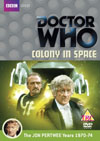DVD Extras include:
Each episode wisely gives us something new to explore. Episode One explores TARDIS travel and the daily struggles of colonists, with a bit of recent mystery thrown in for colour. Episode Two has the Doctor exploring the IMC miners and their point of view, while Jo and the colonists have a sly refugee on their hands to figure out and contend with. Episode Three brings the miners and colonists together for their first confrontation and conflict, while the mysteries of the native civilization mount to a cliffhanger. Episode Four has Jo and the Doctor exploring the old civilization, while the Master shows up to put a few excellent twists into the conflict between miners and colonists. Episode Five is mostly devoted to an exploration of the Master along with his disguise, his motives, and his TARDIS..... Regrettably the constant prisoner-taking shootouts between colonists and miners noticeably get a bit old and overdone at this point. Episode Six still manages to deliver one of Hulke's best written conclusions, particularly for those he wrote all on his own. The Master's high ambitions are finally revealed in full in a successful and believable confrontation with the Doctor, and make sense in terms of all that the Master has done throughout the story. It's a nice touch to see how passionately the Master believes that what he is doing is according to the way things are and should be - he honestly thinks his old friend the Doctor will see the truth of it and join him if he can argue his points well enough, and that that would be preferable to getting rid him. Wonderfully done. The Doctor also manages to be a good listener throughout this and maintain his own point of view, while Jon Pertwee's performance of this part is excellently watchable. Lots of twists keep the events of the ending surprising and exciting; even the final prisoner/miner conflict remains interesting throughout as it becomes more of a direct moral argument than a power struggle in this episode, and the final shootout has the freshness of taking place on location and on film (read: better exciting editing) instead of in that old overused barn again. The few minus marks for the conclusion include a loose-end where Captain Dent is concerned. We've seen his over-confident arrogance largely prevail throughout his large quantity of screen time, but he is thoroughly ignored during the last turn of events. We last see him confidently swivelling around in Ashe's chair, and then that's all folks. Hulke obviously wasn't interested in showing us what happens to him afterwards. This is particularly strange, as he goes to such lengths to show what sad and apocalyptic things happen to good characters like Ashe and the ancient native population. Add to this the sheer number of occurrences throughout the story of another typical Malcolm Hulke trait, where no matter how solid our heroes' plans are, bad luck and circumstance always seem to allow the villains to knock them back to square one, and I think it begins to rather subtly betray an instinct of global martyrdom in Hulke's own belief system. He shows a passion for knowing what's wrong with society and the world (or universe as the case may be), but when solutions are called for, Hulke still doggedly slugs away at stepping on the good and sympathetic characters, while villains practically get away scot-free. Indeed, the Doctor's most major final act here is once more a personal triggering of a total destruction for a sympathetic society. Personally, I suspect that this habitual pattern of thinking contributed to Hulke's loss of health, and perhaps a metaphysical reason why he did not follow along with the rest of us on this planet along a timeline of non-destructive global integration. He seems to need to wait around for the world to blow up, to say "I told you so!" and feel righteous. Anyway.....
Musically, Dudley Simpson manages some new and interesting themes for travel on the planet surface, and for exploration of the underground city, and of course most of the season's signature Master tracks are back as well, but perhaps unfortunately these are not as memorable as the few awful moments when collections of odd silly notes or stings crash upon us from harsh, ill-chosen synthetic instruments. When this is endured during the first few appearances of the spear-toting Primitives, it falsely raises the fear that we will have to put up with more and more of the same as the Primitives gradually get more screen time throughout the story. The wash of sound during the opening scene with the Time Lords is dangerously delicate as well - after dropping a generation from an old, mono, low-fidelity North American broadcast, it blots over the dialogue like a heavy smothering blanket. Anticipation of a good score is thus quickly dampened, even though a decent score is later delivered. It's not as interesting as that of the three previous stories this season though.
Final Line: "Don't try to explain, Jo. He'd never understand."
Rating: Depressing. This reeks of Malcolm Hulke's pessimism as he once
more fails to allow characters to come to understand
each other. What happened to the Brigadier who
argued new scientific theories with Cambridge researchers,
or made great leaps of faith in the abilities
of the TARDIS in "The Web of Fear" (story no. 41)
before getting any evidence whatsoever?
International Titles:Deutsch: (Kolonie im Weltraum)Magyar: "Kolónia az űrben"Français: (La Colonie de l'espace)Русский: "Колония в космосе"English Novelization: "The Doomsday Weapon"This story is available on DVD and VHS video, in colour. Click on the Amazon symbol for the location nearest you for pricing and availability:
Comments on this article are welcome. You may contact the author from this page:
|








